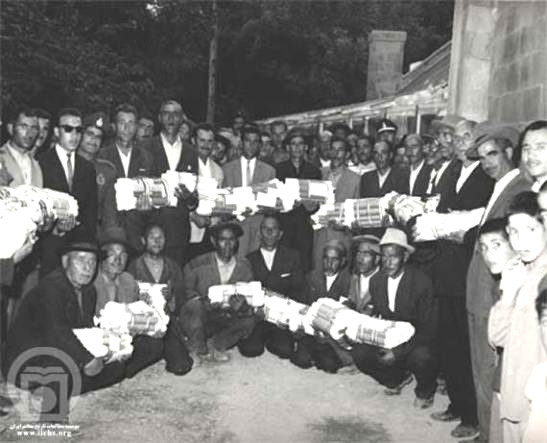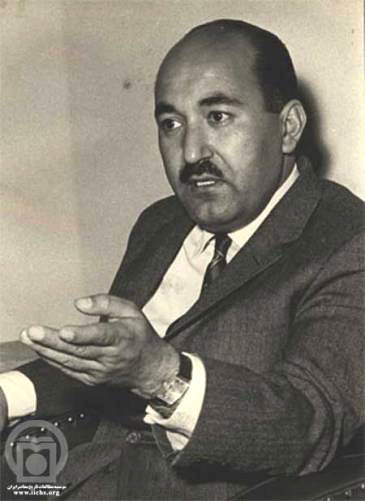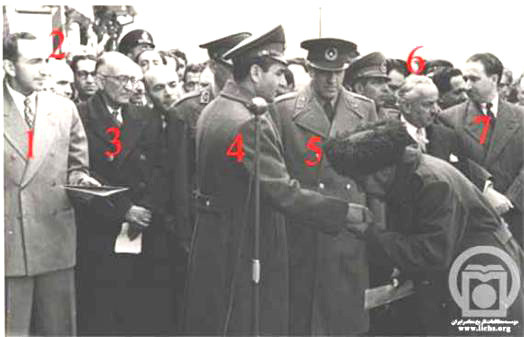Land reform is a change made by the governments in the ownership systems and exploitation of agricultural lands, and it is done in various ways. It is followed with many political outcomes. In many third world countries, land reform meant taking the lands from great landowners and dividing it among the farmers. It might have social grounds and execution of it may lead to the collapse of the cruel system of the feudalism. It may have roots in political grounds and may be executed for the purpose of increasing the defensive power of the peasants.
The grounds for official land reform go back to William Douglass’s visit to Iran in Sept. 1950. In his audience with Mohammad Reza Pahlavi, he mentioned the land reform as one of the main factors to save the country; in his speech in the University of Tehran, he announced the agriculture as the main problem of Iran, and advised the Iranian authorities to execute land reform to block the influence and growth of communism in Iran.
It became clear that land reform was inevitable, and when Ali Amini became prime minister in 1961, the land reform bill which was prepared in Iqbal’s time, was ratified in Amini’s cabinet and Hassan Arsanjani was appointed to carry out the project. Backed by the Americans, Amini’s administration succeeded to execute some parts of this project which was opposed by the Shah and many great landowners. As a result the critiques followed. In the first phase of the reform twenty per cent of the rural people gained land. However, due to the strong opposition of the landowners and the formation of agricultural companies, the first goals of the project were not achieved. On the whole it led to the establishment of capitalist relations in rural areas. It was not positive in the long run because some peasants who did not own any land entered into contracts with the landowners and were turned into land laborers.
The execution of the land reform law did not enjoy any political and economic justification and was not plausible with Iran’s socio economic and political situation.
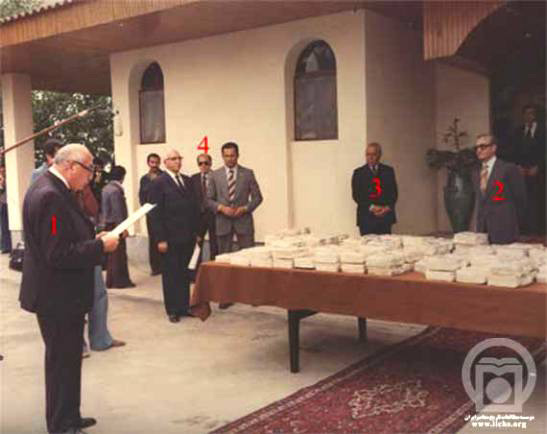
Land Reform
M 125-72
1. Mansur Mozzayyn, 2. Mohammad Reza Pahlavi, 3. Abolfath Atabay, 4. Kiumars Jahanbini
1. Mansur Mozzayyn, 2. Mohammad Reza Pahlavi, 3. Abolfath Atabay, 4. Kiumars Jahanbini
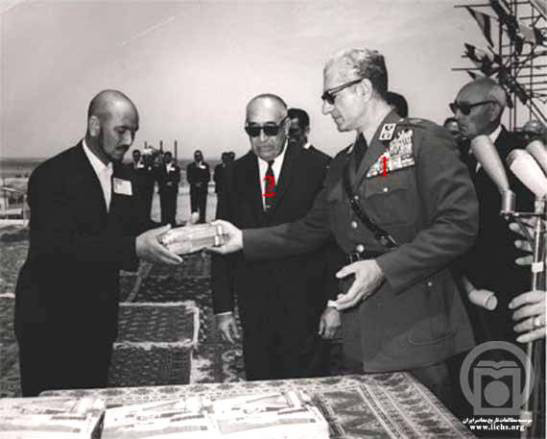
Land Reform
S 7473-758
The Shah distributing the title deeds in Gonbad e Kavus (May 19th, 1969), 1. Mohammad Reza Pahlavi, 2. Mansur Mozayyan
The Shah distributing the title deeds in Gonbad e Kavus (May 19th, 1969), 1. Mohammad Reza Pahlavi, 2. Mansur Mozayyan
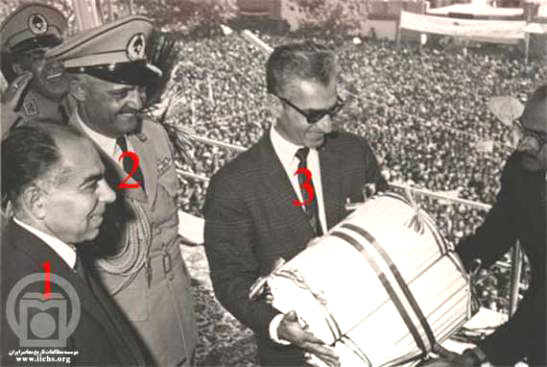
Land Reform
R 113-355
Distribution of title deeds of agricultural lands by Mohammad Reza Pahlavi, 1. Abbas Salur (the head of land reform organization), 2. Ismail Riahi (minister of agriculture), 3. Mohammad Reza Pahlavi
Distribution of title deeds of agricultural lands by Mohammad Reza Pahlavi, 1. Abbas Salur (the head of land reform organization), 2. Ismail Riahi (minister of agriculture), 3. Mohammad Reza Pahlavi
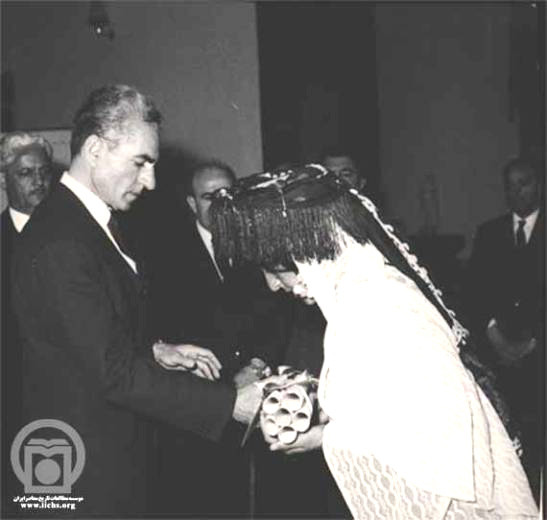
Land Reform
P 121-2588
Mohammad Reza Pahlavi while granting a title deed to a peasant woman, from left: Mohammad Reza Pahlavi, Ismail Riahi (minister of agriculture) , AmirAbbas Hoveida (the prime minister), Bahram Ariana and Kiumars Jahanbini
Mohammad Reza Pahlavi while granting a title deed to a peasant woman, from left: Mohammad Reza Pahlavi, Ismail Riahi (minister of agriculture) , AmirAbbas Hoveida (the prime minister), Bahram Ariana and Kiumars Jahanbini
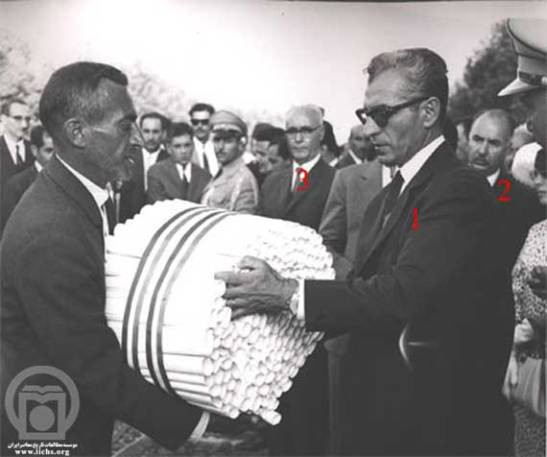
Land Reform
P 86237-339
Mohammad Reza Pahlavi distributing the title deeds in Karaj, 1. Mohammad Reza Pahlavi, 2. Jahanguir Tafazzoli, 3. Ibrahim Riahi
Mohammad Reza Pahlavi distributing the title deeds in Karaj, 1. Mohammad Reza Pahlavi, 2. Jahanguir Tafazzoli, 3. Ibrahim Riahi
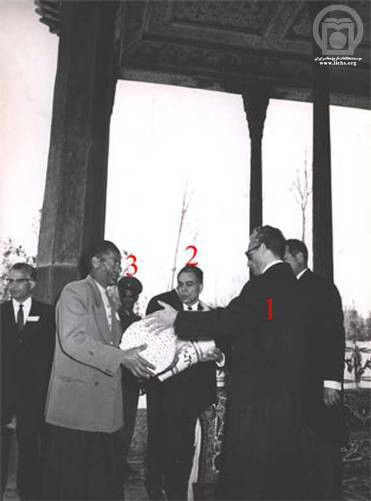
Land Reform
P 121-2967
Mohammad Reza Pahlavi granting the title deeds of agricultural lands in Chehelsotun of Isfahan: 1. Mohammad Reza Pahlavi, 2. Abbas Salur (the head of land reform organization), 3. Kiumars Jahanbini
Mohammad Reza Pahlavi granting the title deeds of agricultural lands in Chehelsotun of Isfahan: 1. Mohammad Reza Pahlavi, 2. Abbas Salur (the head of land reform organization), 3. Kiumars Jahanbini
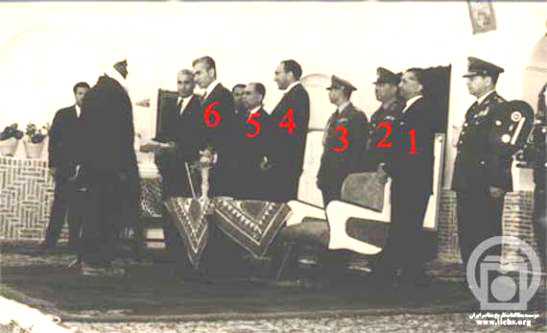
Land Reform
AA 794-654
Distribution of title deeds by Mohammad Reza Pahlavi in Khorassan: 1. Amir Hossein Khozeime Alam, 2. Lieutenant General Sadeq Amirazizi (minister of interior), 3. Mohsen Hasheminejad, 4. Assadollah Alam, 5. Abbas Salur (the head of land reform organization), 6. Mohammad Reza Pahlavi
Distribution of title deeds by Mohammad Reza Pahlavi in Khorassan: 1. Amir Hossein Khozeime Alam, 2. Lieutenant General Sadeq Amirazizi (minister of interior), 3. Mohsen Hasheminejad, 4. Assadollah Alam, 5. Abbas Salur (the head of land reform organization), 6. Mohammad Reza Pahlavi

Land Reform
AA 11-3409
Ali Amini’s administration members in 1961, from the right: Mahmud Raja, Ali Vosuq, Ahmad Namdar, Nosratollah Moinian, Hassan Pakravan, Mohammad Derakhshesh, Nasser Zolfaqari, GholamAli Farivar, Nuraddin Alamuti, Ali Amini, AbdolHossein Behnia, Sadeq Amirazizi, Jamal Ganji, Ibrahim Riahi, Hadi Ashtari, Hushang Samiei, Jahanguir Amuzgar, Hassan Arsanjani (minister of agriculture), Ataollah Khosrovani and Mohsen Forughi
Ali Amini’s administration members in 1961, from the right: Mahmud Raja, Ali Vosuq, Ahmad Namdar, Nosratollah Moinian, Hassan Pakravan, Mohammad Derakhshesh, Nasser Zolfaqari, GholamAli Farivar, Nuraddin Alamuti, Ali Amini, AbdolHossein Behnia, Sadeq Amirazizi, Jamal Ganji, Ibrahim Riahi, Hadi Ashtari, Hushang Samiei, Jahanguir Amuzgar, Hassan Arsanjani (minister of agriculture), Ataollah Khosrovani and Mohsen Forughi

Land Reform
AA 4-5290
The prime minister, Ali Amini signing the deeds for transferring Maraghe lands to the peasants
The prime minister, Ali Amini signing the deeds for transferring Maraghe lands to the peasants
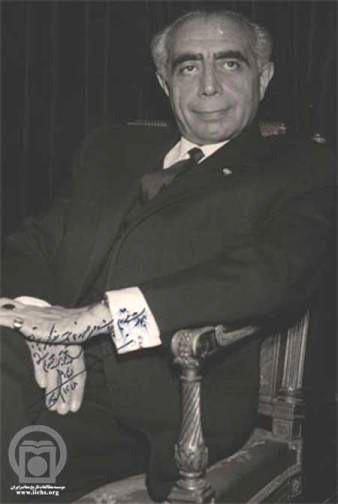
Land Reform
AA 11-1925
Ali Amini the prime minister (Feb. 27th, 1962) (dedicated to Khosrow Hedayat, Iranian ambassador to Belgium)
Ali Amini the prime minister (Feb. 27th, 1962) (dedicated to Khosrow Hedayat, Iranian ambassador to Belgium)
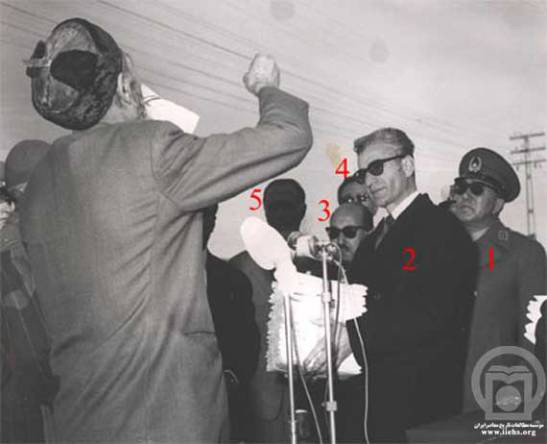
Land Reform
A I 113-233
Mohammad Reza Pahlavi distributing the title deeds of agricultural lands of Zanjan (January 17th 1962), 1. Bahram Ariana, 2. Mohammad Reza Pahlavi, 3. Hassan Arsanjani (minister of agriculture), 4. Davud Rajabi, 5. Abolfath Atabay, 6. Mohsen Hasheminejad
Mohammad Reza Pahlavi distributing the title deeds of agricultural lands of Zanjan (January 17th 1962), 1. Bahram Ariana, 2. Mohammad Reza Pahlavi, 3. Hassan Arsanjani (minister of agriculture), 4. Davud Rajabi, 5. Abolfath Atabay, 6. Mohsen Hasheminejad
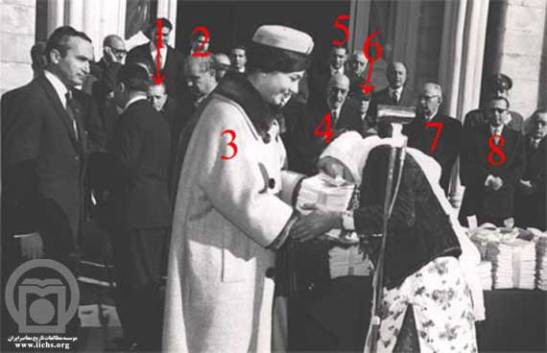
Land Reform
Z 115-3866
Farah Pahalavi granting the title deeds of agricultural lands to a peasant woman (1961), 1. Hossein Ala, 2. Manuchehr Iqbal, 3. Farah Pahlavi, 4. Mohsen Sadr, 5. Rostam Amirbakhtiar, 6. Mahdiqoli Alavi Moqqaddam, 7. Hassan Baqai, 8. Jalaladdin Shademan
Farah Pahalavi granting the title deeds of agricultural lands to a peasant woman (1961), 1. Hossein Ala, 2. Manuchehr Iqbal, 3. Farah Pahlavi, 4. Mohsen Sadr, 5. Rostam Amirbakhtiar, 6. Mahdiqoli Alavi Moqqaddam, 7. Hassan Baqai, 8. Jalaladdin Shademan
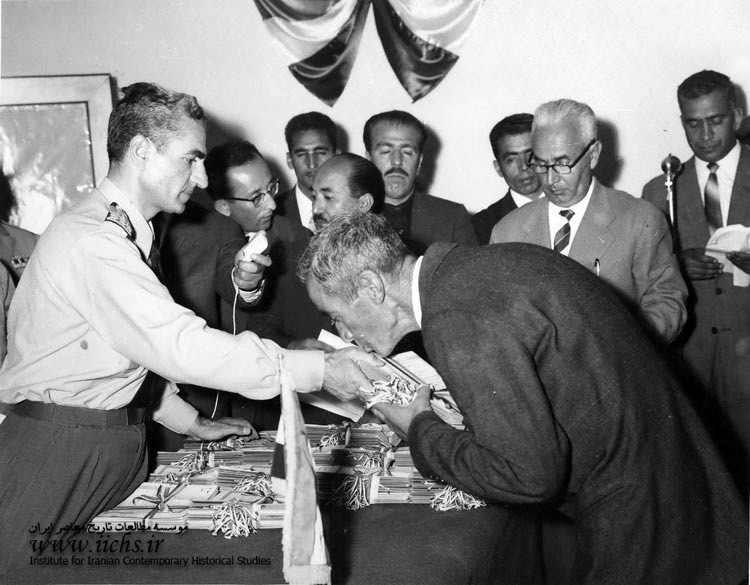
Land Reform
P 121-3349
Distribution of title deeds of Varamin lands by Mohammad Reza Pahlavi (May 14th, 1961) and Hassan Arsanjani (minister of agriculture)
Distribution of title deeds of Varamin lands by Mohammad Reza Pahlavi (May 14th, 1961) and Hassan Arsanjani (minister of agriculture)
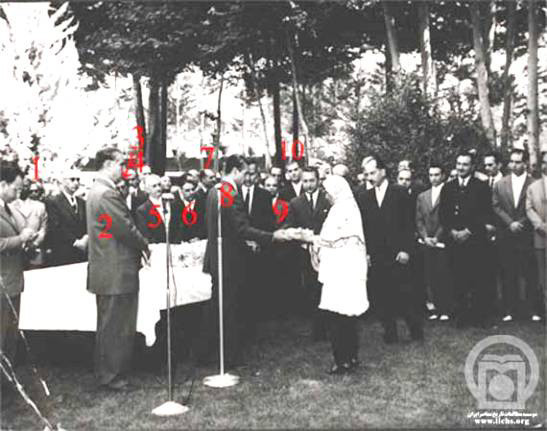
Land Reform
P 121-2646
A peasant woman receiving title deeds from Mohammad Reza Shah Pahlavi: 1. Jalal-addin Shademan, 2. Manuchehr Iqbal, 3. Mehdi Sheibani, 4. Nasser Zolfaqari, 5. Morteza Yazdanpanah, 6. Vali Ansari, 7. Khalil Taleqani, 8. Mohammad Reza Pahlavi, 9. Nosratollah Kassemi, 10. Taghi Sarlak
A peasant woman receiving title deeds from Mohammad Reza Shah Pahlavi: 1. Jalal-addin Shademan, 2. Manuchehr Iqbal, 3. Mehdi Sheibani, 4. Nasser Zolfaqari, 5. Morteza Yazdanpanah, 6. Vali Ansari, 7. Khalil Taleqani, 8. Mohammad Reza Pahlavi, 9. Nosratollah Kassemi, 10. Taghi Sarlak

Land Reform
P 121-2312
Mohammad Reza Pahlavi, ready to distribute the title deeds of Pahlvi properties
Mohammad Reza Pahlavi, ready to distribute the title deeds of Pahlvi properties
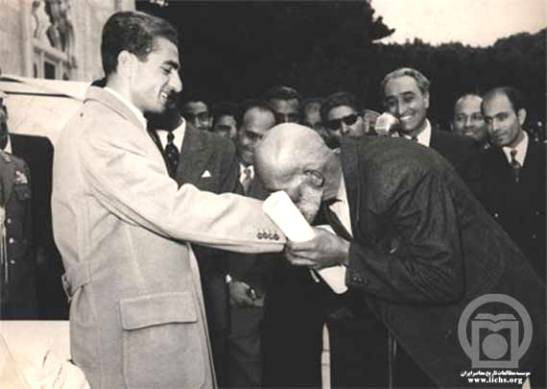
Land Reform
P 121-2307
Distribution of the title deeds by Mohammad Reza Pahlavi in Marmar palace (1950)
Distribution of the title deeds by Mohammad Reza Pahlavi in Marmar palace (1950)
iichs.ir/vdcg.n9wrak93yj54a.html
